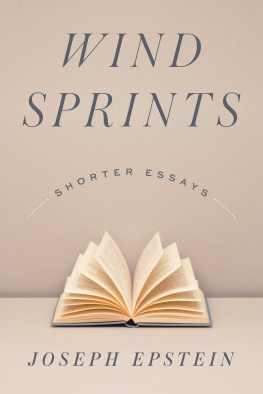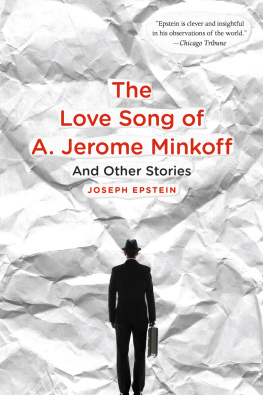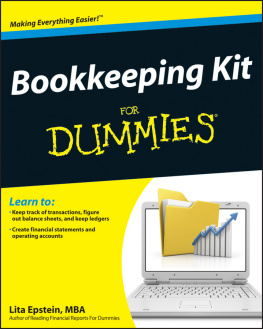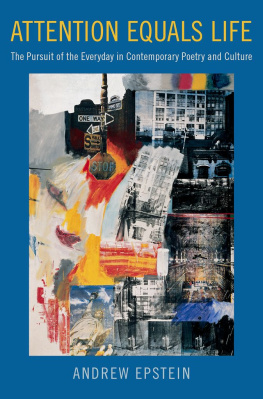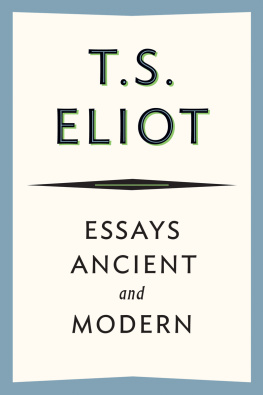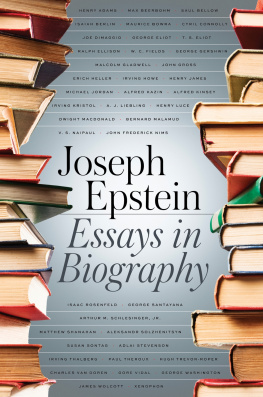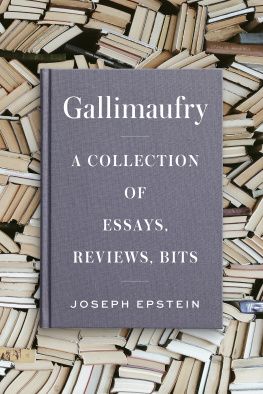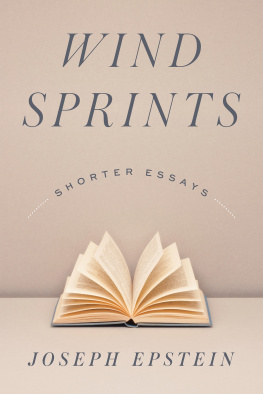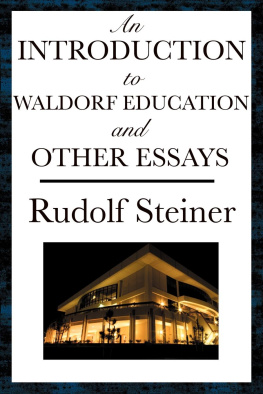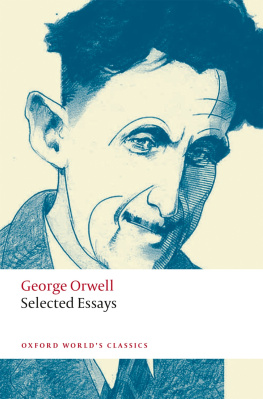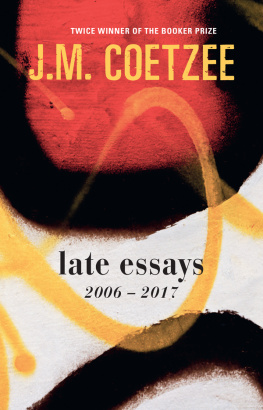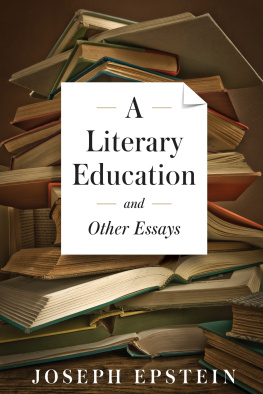Epstein - Wind sprints: shorter essays
Here you can read online Epstein - Wind sprints: shorter essays full text of the book (entire story) in english for free. Download pdf and epub, get meaning, cover and reviews about this ebook. City: Edinburg;VA, year: 2016, publisher: Axios Press, genre: Detective and thriller. Description of the work, (preface) as well as reviews are available. Best literature library LitArk.com created for fans of good reading and offers a wide selection of genres:
Romance novel
Science fiction
Adventure
Detective
Science
History
Home and family
Prose
Art
Politics
Computer
Non-fiction
Religion
Business
Children
Humor
Choose a favorite category and find really read worthwhile books. Enjoy immersion in the world of imagination, feel the emotions of the characters or learn something new for yourself, make an fascinating discovery.
- Book:Wind sprints: shorter essays
- Author:
- Publisher:Axios Press
- Genre:
- Year:2016
- City:Edinburg;VA
- Rating:4 / 5
- Favourites:Add to favourites
- Your mark:
- 80
- 1
- 2
- 3
- 4
- 5
Wind sprints: shorter essays: summary, description and annotation
We offer to read an annotation, description, summary or preface (depends on what the author of the book "Wind sprints: shorter essays" wrote himself). If you haven't found the necessary information about the book — write in the comments, we will try to find it.
Wind sprints: shorter essays — read online for free the complete book (whole text) full work
Below is the text of the book, divided by pages. System saving the place of the last page read, allows you to conveniently read the book "Wind sprints: shorter essays" online for free, without having to search again every time where you left off. Put a bookmark, and you can go to the page where you finished reading at any time.
Font size:
Interval:
Bookmark:
For
CLAUDIA ANDERSON
The elegant, highly intelligent woman in the doormans coat.
S ome writers are dark and some cheerful, some rely on irony and some do nicely without it, some are prolific and some are costive, some write well enough but feel no pressing need to write and some who when they dont write are filled with self-contempt and a strong feeling of hopelessness. I myself fall into the last categorythose writers who feel a desolating sense of uselessness if a few days go by without their writing anything, and writing it for publication.
Any day on which I fail to write at least a few paragraphs is, by my reckoning, a lost day. Should a week go by without my writing something more substantial, therapy may be indicated. Let a month go byand I dont think it has for many yearsyou had better hide my razor and any other sharp instruments that happen to be around my apartment. This pressing need to write marks the writing disease in full fever. Like all interesting maladies, it is a disease with no known cause and no known cure.
I have been fortunate, at least up to this point in my writing life, in having a small band of editors who have encouraged my scribbles for their magazines, and hence they provide a regular outlet for my scribbling fever. A few among them prefer, though I hope not from me alone, shorter scribbles, literary sprints rather than marathons. I, though I began writing longish essays, enjoy writing a piece of anywhere from eight hundred to fifteen or so hundred to two thousand words, pieces of the kind that make up the substance of this book.
Writers continue to produce six-hundred page novels and two-volume biographies and, in the case of the Danish writer Karl Ove Kanusgard, continuous autobiographical works running to six and more volumes, but the current tendency in serious as well as purely entertaining writing is for shorter and shorter pieces, books, even lectures and talks. The world has, if not perhaps run out of patience, considerably shortened its attention span. We live in the era of the telephone text, the tweet, the Instagram, and people are inclined to blame them for the jittery nature of contemporary concentration. But this shortening of the attention span set in long before these advances, if advances they be, in technology.
As a university teacher, I sensed years ago that it wouldnt do to deliver fifty-minute-long lectures to my students, lest I gently put them asleep. In an earlier day, the New Yorker used to run three- to four-part profiles and pieces even longer on the subjects of geology or wheat, and no one complained. In collecting my own longer essays recently, I noted that some among them run to 10,000 words; today magazines once hospitable to essays of that length set their outer limits at around three to four thousand words. Make it shorter is the watchword of the day. Less is not necessarily more, but less is distinctly what is wanted.
The majority of the pieces in this book were written for the section that appears at the front of the Weekly Standard magazine under the rubric of Casual . A casual in the Weekly Standard can be about almost anything: from an incident in domestic life to a current social trend to a complaint about contemporary nuttiness to a personal obituary for a friend or family member. The only constraints in a Weekly Standard casual are length: taking up a single page in the magazine, and allowing room for an often brilliant comic illustration, they run to no more than 825 or so words.
I have been writing these casuals, at the rate of roughly one a month, since not long after the Weekly Standard began publication in 1995. Some I have been able to write in two or three hours; some I have struggled over, searching for the right ending, for days. I find great pleasure in composing them. My first audience for these casuals, after myself, has been Claudia Anderson, the editor whom I can count on to catch me out in small yet if let pass embarrassing errors, suggest always useful changes, and to get back to me within half-an-hour or so after my sending a casual to her. She is every scribblers dream of a perfect editor.
Other of the pieces in this book have appeared in the Atlantic , the Wall Street Journal , the London Daily Telegraph , and elsewhere . Some I wrote at my own inspiration, some were suggested by editors. Turning out pieces quickly, and on request, has allowed me the pleasing illusion that I am, so to say, working press: hat tipped back, cigarette dangling from lower lip, bottle of booze in bottom desk drawer. Doing so also encourages the notion that I am beginning to achieve command of my craft. To keep to the track and field metaphor set out in the title of this book, it is pleasing to think one can compete at different events: sprints (these pieces), the 440 (literary criticism), the mile (longer personal essays), the marathon (book-length essays), pole vault (short stories), and other events in the great decathlon that is literature.
Joseph Epstein
(1996)
A n entry in my journal of roughly five years ago reads: I learned that my cholesterol count is a very fine 185. Must carefully cross all streets. It would be a shame to die with so splendid a cholesterol count. On the other hand, it might give my son a talking point at my memorial service. My father, I can hear him say, was a man well in control of his life, as witness his cholesterol count of only 185. I hope he will not mention that he often remembers me glancing down upon my plate at yet another boned, skinless chicken breast and looking gloomy at the prospect.
I am the man who coined the phrasenot yet in wide currencyentre envy. Entre envy denotes that moment in a restaurant when the waiter brings out everyones main course, and you look around the table in the hope of discovering that no one has ordered a more enticing dish than yours. In my case, entre envy includes the hope that no ones plate has more food piled upon it than mine.
My natural voraciousness conflicts badly with my growing desire for long life. I grew up in Chicago on a diet of corned-beef sandwiches, hot dogs, sausage pizzas, steaks, chops, chopped liver, and rare roast beef, served in a series of restaurants that, if Jane Brody had anything to say about it, would be compelled to have at least two full-time cardiologists on the payroll. I used to go to a restaurant in Skokie, Illinois, called The Original Big HermsThe Hermitage, as I prefer to think of itwhich served an Italian beef-and-sausage combo sandwich with sweet peppers that required three hands and fourteen small paper napkins to manipulate and consume, and then afterward there was the dry-cleaning bill to consider. In youth, my idea of a nightcap was four fingers of salami, a dozen chocolate-chip cookies, and a pint of butter-pecan ice cream, after which I slept the sleep of the just.
I talk a big game but, wretched truth to tell, live rather a small one. To get some numbers on the table, I am 57 and weigh 130 pounds. A further confession: I use a Nordic Walk-Fit, treading its inclined track to oblivion for at least half an hour every other day. I am, I suppose, fit as a fiddle, an odd simile since the same cannot be said for most of our contemporary fiddlers, Perlman, Zuckerman, Stern, enviably happy, chubby chappies all.
Each meal poses the question: Is it better to enjoy ones food and die younger or live longer with considerably lessened pleasure? Every day is the Ides of March, and I await the knifethe knife not of the assassin but of the surgeon. I anticipate the procession: chest pain, stress test, angiogram, bloody blade, interior lanyards of arteries, quintuple, septuple bypasses leaving a thorax looking like a highway map around the city of Ypsilanti. Maybe I ought to order the whitefish.
Font size:
Interval:
Bookmark:
Similar books «Wind sprints: shorter essays»
Look at similar books to Wind sprints: shorter essays. We have selected literature similar in name and meaning in the hope of providing readers with more options to find new, interesting, not yet read works.
Discussion, reviews of the book Wind sprints: shorter essays and just readers' own opinions. Leave your comments, write what you think about the work, its meaning or the main characters. Specify what exactly you liked and what you didn't like, and why you think so.

